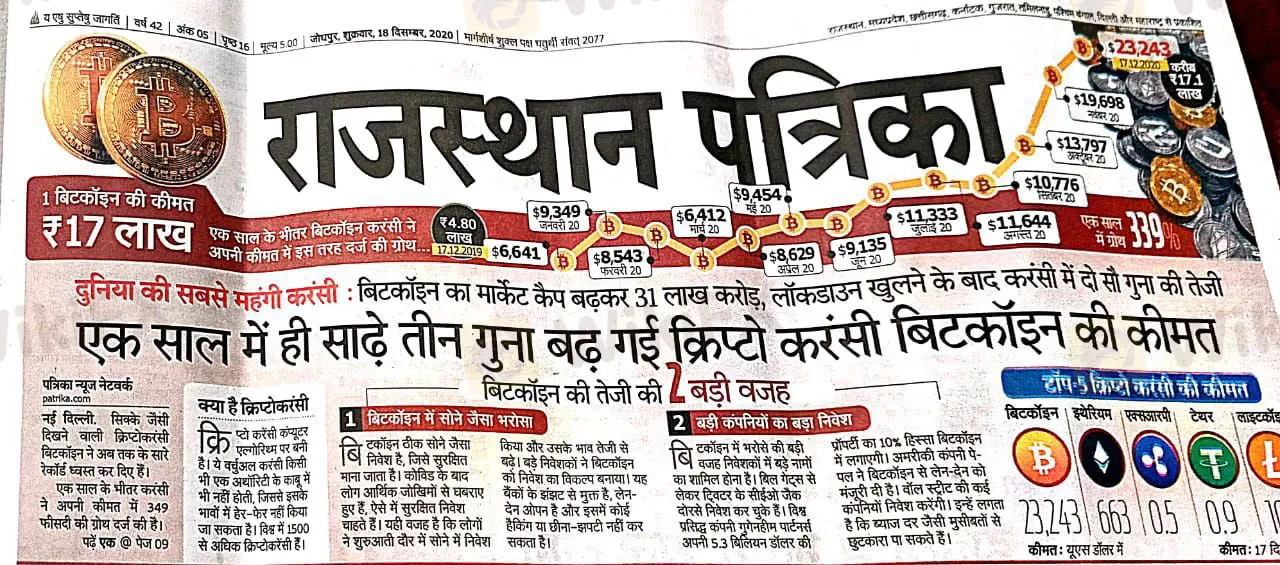简体中文
繁體中文
English
Pусский
日本語
ภาษาไทย
Tiếng Việt
Bahasa Indonesia
Español
हिन्दी
Filippiiniläinen
Français
Deutsch
Português
Türkçe
한국어
العربية
Why Cryptocurrencies Are Surging?
Abstract:In the last fortnight, Bitcoin and cryptocurrencies have taken the world by a storm. The currency has hit $22,000 in value and is being compared to gold.
In the last fortnight, Bitcoin and cryptocurrencies have taken the world by a storm. The currency has hit $22,000 in value and is being compared to gold.
Some bitcoin investors predict the virtual currency could rise to as high as $100,000 in a year. That is around five times its current value.

Bitcoin and cryptocurrencies valued high
In India, the average daily crypto currency trading volumes across the top exchanges has grown by nearly 500% since March, 2020.
According to data from CoinGecko, the average daily traded volume across the top four Indian crypto currency exchanges stood at over $22.4 million as of December 16, 2020 compared to a little under $4.5 million as of March 1, 2020. The exchanges include WazirX, ZebPay, CoinDCX and BitBNS.

Data source: CoinGecko
But what is driving crypto surge in India? It is undeniable that coronavirus pandemic accelerated the “cryptocurrency revolution”. According to Bitcoin tycoon Mike Novogratz, “In five years from now, we are going to see 2020, as horrible as corona was, and lots of people have lost their lives...we are going to look back and in some weird way, this is going to have been a blessing for the cryptocurrency revolution.”
Besides, a shift from peer-to-peer to exchange-administered payments has fueled a sharp rise in cryptocurrency trading in India since March 2020. The Supreme Court invalidated an Reserve Bank of India (RBI) ban on crypto payments on 5 March, allowing banks to do business with crypto exchanges.

These exchanges resumed rupee transactions, allowing their customers to convert rupee to cryptocurrencies and vice versa. The rebound in exchange trading has been accompanied by a thaw in mainstream responses to cryptocurrenies.
Moreover, since neither the RBI nor the government has introduced new guidelines or restrictions on crypto investing, Indian banks have begun providing various services to domestic exchanges such as payment gateways, working capital loans and other facilities. Some of the leading banks including HDFC Bank, Yes Bank, State Bank of India, ICICI Bank along with smaller government-owned and private banks are now doing business with Indian crypto exchanges.
Disclaimer:
The views in this article only represent the author's personal views, and do not constitute investment advice on this platform. This platform does not guarantee the accuracy, completeness and timeliness of the information in the article, and will not be liable for any loss caused by the use of or reliance on the information in the article.
Read more
WikiFX Broker
Latest News
TradingView Brings Live Market Charts to Telegram Users with New Mini App
Trump tariffs: How will India navigate a world on the brink of a trade war?
Interactive Brokers Launches Forecast Contracts in Canada for Market Predictions
Authorities Alert: MAS Impersonation Scam Hits Singapore
Stocks fall again as Trump tariff jitters continue
INFINOX Partners with Acelerador Racing for Porsche Cup Brazil 2025
Regulatory Failures Lead to $150,000 Fine for Thurston Springer
April Forex Trends: EUR/USD, GBP/USD, USD/JPY, AUD/USD, USD/CAD Insights
March Oil Production Declines: How Is the Market Reacting?
Georgia Man Charged in Danbury Kidnapping and Crypto Extortion Plot
Currency Calculator








